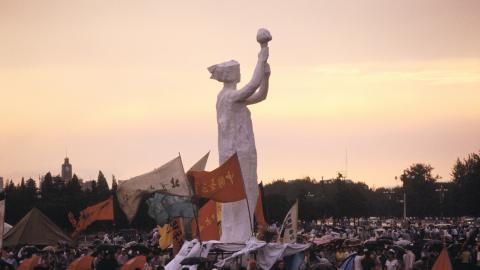(Editor’s note: This article appeared in the Wall Street Journal on June 5, 1989. Claudia Rosett died Saturday at 67.)
Beijing
From behind a burning bus barricade Saturday night [June 3] comes the gunfire of soldiers advancing toward Tiananmen Square. The shots are answered by the angry yells of thousands of citizens defending Chang An Road about two miles west of the square. People snatch up bricks and bottles, their only weapons against the guns of their country’s own army. Then, faces grim, they start to fall back. The soldiers overrun the flaming roadblock, and under the midnight sky can be seen as a dark line of helmets moving fast toward the crowd. Panicked, people turn and run back a few hundred yards to rally by the next bus barricade. Bullets ricochet off the stone walls that line the road. A young man, blood running from his forehead, stumbles toward the sidewalk.
The crowd sets fire to a bus and a truck at this next barricade. When the truck’s gas tank explodes, a man’s pants catch fire. He runs screaming down the street, people beating at his clothes with their hands to put out the flames. Nearby, a woman climbs up on a pylon to watch the troops. Three men pull her down to safety as bullets crack into the walls just ahead. The soldiers keep coming, and behind them now shine the headlights of armored personnel carriers—their treads shaking the pavement. As the crowd falls back again, a man in thick spectacles stops a Western reporter to volunteer in English a comment that will be heard many times before dawn Sunday. “Terrible,” he says. “Very terrible.”















